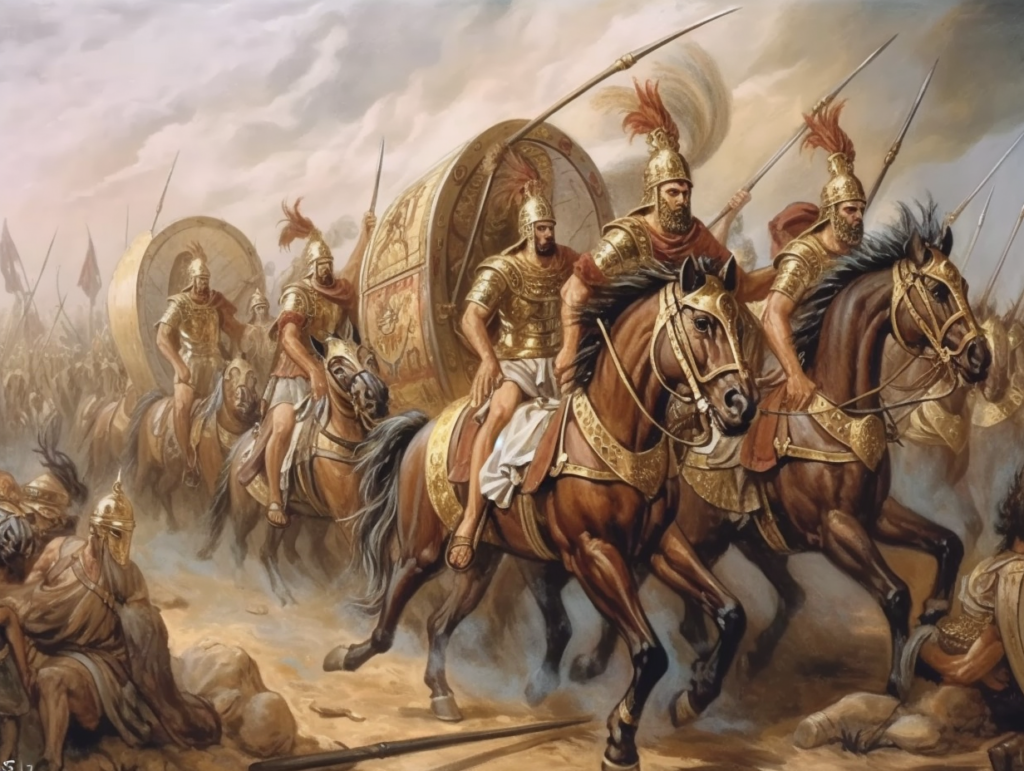Did you ever wonder when the Trojan War actually happened? Well, in this article, we will dive into the various theories, historical context, ancient texts, and archaeological evidence surrounding the timeline of the Trojan War.
Get ready to explore the debates and controversies that surround this fascinating event in history. So, grab a seat and prepare to uncover the secrets of when the Trojan War took place.
Key Takeaways
- Theories on the chronology of the Trojan War include the Late Bronze Age theory, Early Bronze Age theory, fictional event theory, and real historical event theory.
- The geopolitical landscape of the eastern Mediterranean during the Late Bronze Age involved the Hittite Empire, Mycenaean Greece, the Egyptian New Kingdom, Mitanni Kingdom, and Troy.
- Ancient texts and accounts of the Trojan War, such as Homer’s Iliad and Odyssey, provide detailed narratives and different perspectives on the conflict.
- Archaeological evidence, including the ruins of Troy and artifacts found at Troy and Mycenae, supports the existence of the Trojan War, although there is debate and controversy over its exact timeline.
Theories on the Chronology of the Trojan War
There are several theories on the chronology of the Trojan War that you should consider. One theory suggests that the war took place in the late Bronze Age, around the 12th or 13th century BCE. This theory is based on archaeological evidence found at the site of Troy, such as pottery and fortification walls.
Another theory proposes that the war occurred in the early Bronze Age, around the 15th or 16th century BCE. Proponents of this theory point to the Hittite texts, which mention a conflict between the Hittites and a city called Wilusa, believed to be Troy.
Additionally, some scholars argue that the Trojan War was a fictional event created by the ancient Greeks. They believe that the story of the war was passed down through generations as a way to explain the origins of their society and culture. However, others argue that the Trojan War was a real historical event, albeit with some embellishments and exaggerations. They believe that the war was fought over control of trade routes and resources in the eastern Mediterranean.
Historical Context of the Trojan War
To understand the historical context of the Trojan War, you should consider the geopolitical landscape of the eastern Mediterranean during the Late Bronze Age. This period, spanning from approximately 1600 to 1200 BC, was characterized by the rise and fall of powerful empires and city-states. Here is a table summarizing the major players during this time:
| Empire/City-State | Brief Description |
|---|---|
| Hittite Empire | A dominant power in Anatolia, with its capital in Hattusa. |
| Mycenaean Greece | A collection of city-states on the Greek mainland, known for their advanced culture. |
| Egyptian New Kingdom | Ruled by pharaohs, Egypt was a formidable force in the region. |
| Mitanni Kingdom | A kingdom in northern Mesopotamia, known for its strong chariot warfare. |
| Troy | Located in modern-day Turkey, Troy was a wealthy city and a key player in the region. |
The interactions and conflicts between these entities set the stage for the Trojan War. The war itself was a culmination of tensions, power struggles, and trade disputes among these powerful civilizations. Understanding the historical context allows us to appreciate the significance of the Trojan War and its impact on the ancient world.
Ancient Texts and Accounts of the Trojan War
One of the most well-known accounts of the Trojan War is found in Homer’s epic poem, the Iliad. This ancient text provides a detailed narrative of the events surrounding the war and the heroes involved. The Iliad portrays the conflict between the Greeks and the Trojans, sparked by the abduction of Helen, the wife of Menelaus, by Paris, the prince of Troy. The poem describes the battles, the strategies employed by both sides, and the tragic consequences of the war.
Another ancient text that references the Trojan War is the Odyssey, also written by Homer. In this epic, the hero Odysseus embarks on a long and arduous journey back to his homeland of Ithaca after the war. Along the way, he encounters various challenges and obstacles, including mythical creatures, enchanting goddesses, and treacherous allies. The Odyssey provides glimpses into the aftermath of the Trojan War and the impact it had on the lives of the Greek heroes.
Apart from these Homeric epics, other ancient accounts of the Trojan War can be found in the works of Greek historians such as Herodotus and Thucydides. These accounts provide different perspectives on the war and its historical significance. They offer valuable insights into the political, cultural, and social context of the time.
Archaeological Evidence and the Trojan War
Did you know that archaeological evidence and historical records both support the existence of the Trojan War? Archaeologists have uncovered several sites that are believed to be related to the war described in ancient texts. One of the most significant archaeological discoveries is the ancient city of Troy, located in modern-day Turkey. Excavations at Troy have revealed multiple layers of ruins, indicating that the city was destroyed and rebuilt several times. This aligns with the accounts of the Trojan War, which describe the city being besieged and eventually destroyed by the Greeks.
Furthermore, artifacts found at Troy provide further evidence of the war. Weapons such as swords, spears, and arrowheads have been discovered, suggesting that a violent conflict took place at the site. Additionally, the presence of defensive walls and fortifications indicates that the city was prepared for warfare.
Other archaeological sites in the region have also yielded evidence of a war. For example, Mycenae, an ancient city in Greece, has been found to contain artifacts and structures that date to the Late Bronze Age, the time period in which the Trojan War is believed to have occurred.
Debates and Controversies Surrounding the Trojan War’s Timeline
Have you ever wondered about the debates and controversies surrounding the timeline of the Trojan War? The exact dates of the war have been a subject of intense debate among historians and archaeologists. While the story of the Trojan War has been immortalized in ancient Greek texts, such as Homer’s Iliad and Odyssey, there is still no consensus on when it actually took place.
One of the main reasons for the controversy is the lack of concrete archaeological evidence that can definitively link the war to a specific time period. Scholars have proposed various theories based on the analysis of ancient texts, pottery, and other artifacts, but none have been universally accepted.
Let’s take a look at some of the different proposed timelines for the Trojan War:
| Theories | Dates (BCE) |
|---|---|
| Traditional Chronology | 1194-1184 |
| Lower Chronology | 1250-1230 |
| Middle Chronology | 1400-1300 |
| Higher Chronology | 1600-1400 |
| Very High Chronology | 1800-1700 |
As you can see, there is a wide range of dates that have been suggested for the Trojan War. The traditional chronology places the war in the late 12th century BCE, while the higher chronology suggests a much earlier time period in the 17th or 18th century BCE.
The debates and controversies surrounding the timeline of the Trojan War continue to intrigue scholars and history enthusiasts alike. Until more concrete evidence is discovered, the exact dates of this ancient conflict will remain a mystery.
Frequently Asked Questions
Were the Trojans and Greeks the Only Civilizations Involved in the Trojan War?
No, the Trojans and Greeks were not the only civilizations involved in the Trojan War. Other groups like the Amazons and the Ethiopians also had a role to play in this ancient conflict.
What Were the Major Consequences and Long-Term Impact of the Trojan War?
The major consequences and long-term impact of the Trojan War were significant. The war led to the destruction of Troy and the spread of Greek culture throughout the Mediterranean.
How Did the Trojan War Influence Ancient Greek Culture and Mythology?
The Trojan War greatly influenced ancient Greek culture and mythology. It shaped their understanding of heroism and tragedy, and many of their famous stories and characters were born from the events of the war.
Is There Any Evidence of Trojan War Survivors or Descendants in Historical Records or Genetic Studies?
There isn’t any evidence of Trojan War survivors or descendants in historical records or genetic studies. However, it’s always possible that new discoveries could shed light on this topic in the future.
Did the Trojan War Have Any Influence on Neighboring Civilizations or Societies at the Time?
The Trojan War had a significant influence on neighboring civilizations and societies at the time. It sparked alliances, rivalries, and cultural exchanges among the ancient Greeks and other Mediterranean civilizations.







